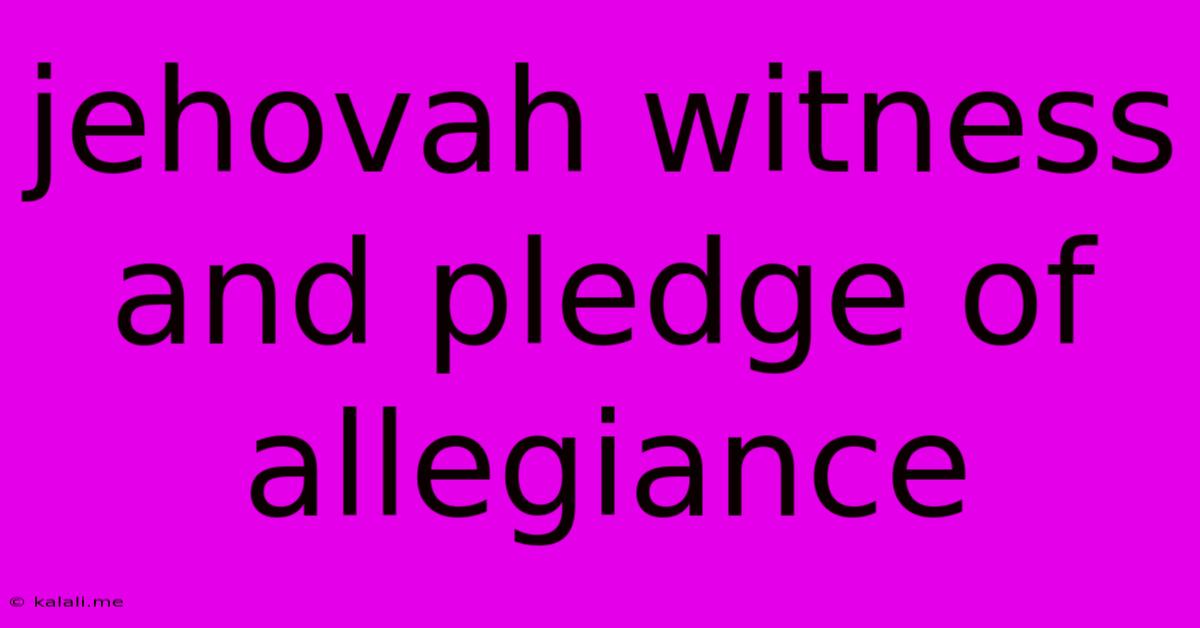Jehovah Witness And Pledge Of Allegiance
Kalali
Jun 02, 2025 · 3 min read

Table of Contents
Jehovah's Witnesses and the Pledge of Allegiance: A Matter of Conscience
The Pledge of Allegiance, a daily ritual in many American schools, presents a unique challenge for Jehovah's Witnesses. This article explores the reasons behind their refusal to recite the Pledge, highlighting the religious beliefs that underpin this decision and addressing common misconceptions. Understanding their perspective requires delving into their core theological convictions about worship and loyalty.
Jehovah's Witnesses do not recite the Pledge of Allegiance due to their deeply held religious beliefs. Their refusal isn't a sign of disrespect towards the country or its institutions but stems from their understanding of Bible-based principles concerning the worship of God and loyalty to their faith. This stance often leads to misunderstandings and necessitates a nuanced explanation.
Core Beliefs: Why Jehovah's Witnesses Refuse the Pledge
At the heart of their refusal lies the biblical command against idolatry and the worship of any being other than Jehovah God (Exodus 20:3-5). Jehovah's Witnesses believe that pledging allegiance to a flag, symbol, or nation equates to worshipping a created thing rather than the Creator. They see the flag as a symbol representing a nation, and reciting the Pledge as an act of worship directed towards that nation, thereby violating their religious convictions.
Furthermore, their understanding of Christian neutrality plays a crucial role. They believe that true Christians should remain neutral in political affairs, avoiding involvement in the conflicts and divisions of the world. Reciting the Pledge, in their view, constitutes an act of political allegiance that compromises their neutrality. This neutrality isn't apathy; it's a conscious choice based on their interpretation of biblical teachings concerning the separation of religious and secular affairs. This principle guides their lives in various aspects, from participation in warfare to involvement in political campaigns.
Misconceptions and Clarifications
Many misunderstand Jehovah's Witnesses' refusal of the Pledge as unpatriotic or disloyal. This is a significant misconception. Jehovah's Witnesses often demonstrate their civic responsibility through law-abiding behavior, paying taxes, and contributing to society in positive ways. Their refusal to recite the Pledge is a matter of conscience, deeply rooted in their faith, not a rejection of their community or country. They strive to be good citizens, contributing positively to society while maintaining their religious integrity. They often actively promote peace and unity through their community outreach programs.
The Role of Parental Guidance and Education
Parents who are Jehovah's Witnesses typically educate their children about their beliefs regarding the Pledge of Allegiance. This education aims to instill an understanding of their faith and its implications, fostering a respect for their conscience and encouraging responsible citizenship despite their unique perspective. The focus is on teaching their children the importance of obedience to God above all else.
Legal Protections and Freedom of Religion
The First Amendment of the U.S. Constitution guarantees freedom of speech and religion. Court cases have consistently upheld the right of Jehovah's Witnesses, and other individuals, to abstain from reciting the Pledge of Allegiance based on their religious beliefs. This right is considered essential for protecting religious freedom and individual conscience. These legal protections emphasize the importance of respecting diverse viewpoints and religious practices within a democratic society.
In conclusion, the Jehovah's Witnesses' refusal to recite the Pledge of Allegiance is a complex issue stemming from deeply held religious beliefs. Understanding their perspective requires acknowledging the significance of their interpretation of biblical commands and their commitment to Christian neutrality. It's a matter of conscience, not disloyalty, and is protected by the principles of religious freedom.
Latest Posts
Latest Posts
-
Leviton 4 Way Switch Wiring Diagram
Jun 03, 2025
-
Rotten Egg Smell In House No Gas
Jun 03, 2025
-
How Do You Patch A Hole In A Door
Jun 03, 2025
-
Whatever You Put Before God Is A Sin
Jun 03, 2025
-
Why Is There Water In My Dryer
Jun 03, 2025
Related Post
Thank you for visiting our website which covers about Jehovah Witness And Pledge Of Allegiance . We hope the information provided has been useful to you. Feel free to contact us if you have any questions or need further assistance. See you next time and don't miss to bookmark.